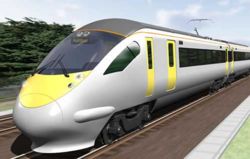Olympic Javelin
The Olympic Javelin is a planned high-speed train shuttle service announced as part of the successful London 2012 Olympic bid. It is an integral part of the plan to improve public transport in London in readiness for the 2012 Summer Olympics, an area of the bid that was initially regarded as being poor by the International Olympic Committee (IOC).
The service will run for the duration of the games, between St Pancras station and Ebbsfleet International station, via Stratford International station, which will be situated within the planned Olympic Park.
Services
The journeys from St Pancras and Ebbsfleet International are expected to take 7 to 8 minutes and 10 to 15 minutes respectively, with trains running in both directions every six minutes. St. Pancras will allow for connections with the Underground, and trains to/from the Midlands, Scotland, and North of England, while Ebbsfleet will provide connections to/from train and bus services in North Kent and the Thames Gateway. In order to release track capacity, Eurostar trains will skip Stratford during the games, so spectators arriving from the Continent will have to change at Ebbsfleet.
On both legs the service will run exclusively on tracks of Section 2 of the high-speed Channel Tunnel Rail Link.
The service is to be operated by Southeastern as part of the domestic services on the Channel Tunnel Rail Link.
It is expected that over 80% of Olympic spectators will travel to and from the venues by rail. Services to the Olympic Park are projected to have a capacity of 240,000 travellers per hour, with around 25,000 of those using the Javelin service.
Trains
It is planned that the service will use the same fleet of Class 395 trains as ordered for the Channel Tunnel Rail Link domestic commuter services, known as 'CTRL-DS'.
An order worth £250 million has been placed with Hitachi Europe for 28 high speed 'A-trains', based on the same technology as the Japanese Shinkansen high-speed trains. These are expected to be in service by 2009, and should reach speeds of 140 mph (225 km/h).
See also
References
- 28 October 2004 - "£20m bullet trains to serve Olympic Park" at London2012.org. Accessed 6 July 2005.
- 28 October 2004 - "Hitachi wins Channel Tunnel Rail Link Contract" at Hitachi-Rail.com. Accessed 12 April 2006.
- 29 October 2004 - "Hitachi is the preferred manufacturer to build new high speed trains" at The Government Office for London
- 1 June 2005 - "£250 Million Contract Signed for New High Speed Train Fleet for Kent" at SRA.gov.uk. Accessed 13 July 2005.
- 6 July 2005 - "Metro articles - No small victory" at TFL.gov.uk. Accessed 9 July 2005.
- The Olympic Javelin at London2012.org. Accessed 9 July 2005.
External links
- 2012 Olympics transport projects at AlwaysTouchOut.com
- Channel Tunnel Rail Link (including domestic services) at AlwaysTouchOut.com
- "London Olympic Transport"
- "Olympic transport plans are on track"

